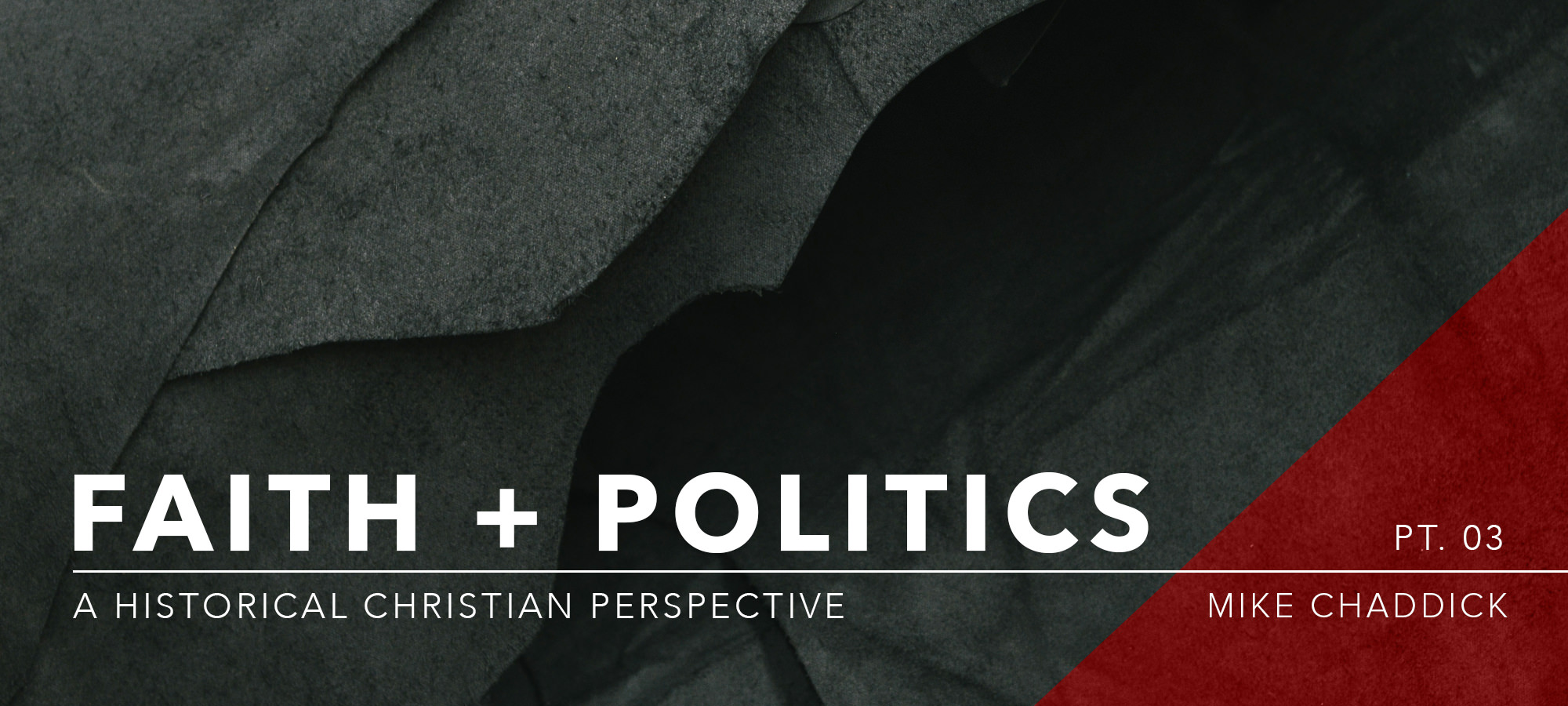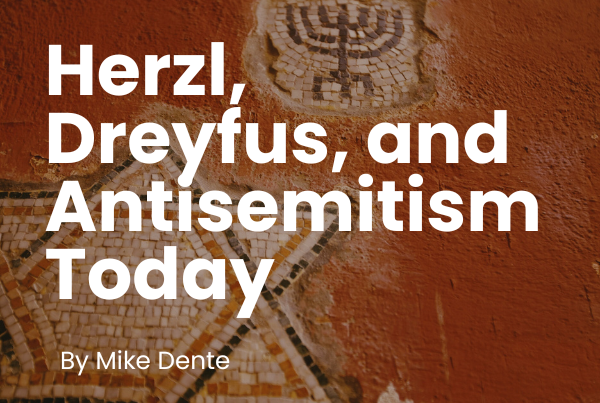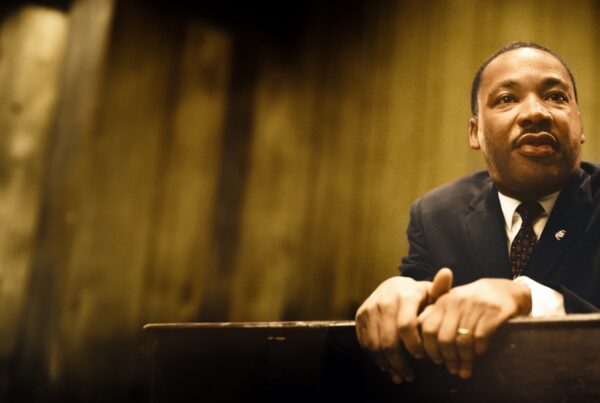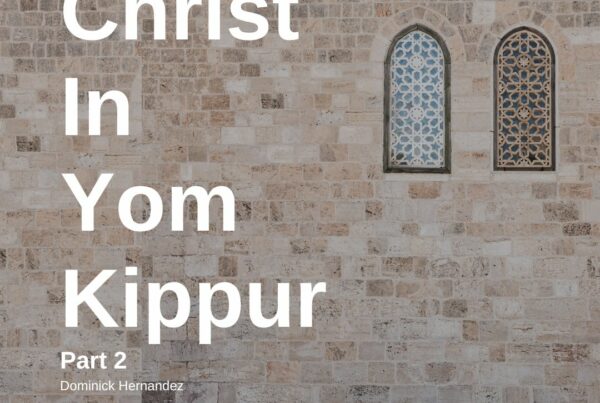
This article is Part 3 of a 3 part series. You can find Part 1 & 2 here: Part 1 Part 2
Part 1 in this series began with the overall question of what does faith have to do with politics? A portion of the article was dedicated towards the early years of the Church and its involvement with politics. Part 2 continues on this focus of the Church’s history, from Emperor Constantine’s reign throughout the latter part of the 300’s A.D. In this last part of the series, the final focus is on the development of the Church-State ideologies that have affected America since its birth as a nation. As a conclusion to the series, the hope is to provide a more solidified understanding of how a Christian should balance their role in society within the political and ideological world we live in.
The Road Leads Here: An American Christian Perspective
America is in some ways (perhaps many) a reaction against the things that have gone on in Europe over the last millennia. For our purposes, here are two of those main things: (1) kings, queens, and dictators have been replaced by the Constitution [which establishes the 3 branches of government] and popular opinion. The American founders wanted neither a tyrannical dictator, nor a tyranny of the majority, hence the political structure of our country as a federal republic. You will notice there is a deliberate attempt to separate religion from politics (i.e. the state) in America due to the long history of religious wars in Europe. Now some Christians might be quick to refute such a notion by saying, “Ah, but the Constitution does not use the word separation,” and then they may go on about how the word ‘separation’ is attributed to Karl Marx’s Communist Manifesto, or something like it.
While I agree that some people (e.g. secularists) certainly misrepresent the conception of separation in this way, on the other hand, we ought to avoid such a hasty generalization in the opposite direction that completely ignores the historical context of the Constitution. Arguing that no ‘separation’ of any kind was envisioned by the Founding Fathers for the Church-State relationship in America has no historical support. For example, Richard Howland Maxwell, of the Pilgrim Hall Museum, explains the basic, historical context behind the language used in the First Amendment. He wrote:
“The Church of England was the official and only church in England. Everybody belonged to it, whether they wanted to or not. Every resident of a given community was automatically a member of the parish in that community…
Because it was an extension of the government, the English church was as subject to political abuse and favoritism as any other governmental agency. One result was that the office of the parish priest became a sinecure given as an expression of the favor of the hierarchy; many of the clergy were assigned to parishes but never went near them! The church members had nothing to say about all of this; they were expected to quietly accept whatever the hierarchy of the church thrust upon them.”[1]
As you can see, it was imperative that some kind of ‘separation’ of Church and State be established in order to avoid repeating the past situation in England.
Granted, my personal feeling is that the language of the Constitution aimed to keep the state out of the church, more than the other way around. But to argue this way presupposes a “conservative” reading of the Constitution as opposed to a “progressive” reading and is not necessarily based on a biblical principle, from which I can argue for personal opinion as a Christian.[2] In either case, American Christians would do well to remember that the Constitution is not Scripture. We do not have the Constitution in common with our spiritual ancestors, but rather the Bible in a changing world. I say this because we must remember that our way of doing things in America (at least conceptually) vastly differs from the way it was done in ancient Israel, Israel’s Ancient Near Eastern neighbors, and the Church for over 1,700 years.
So where are we getting our opinions from? How much of our political convictions are culturally conditioned rather than scripturally based? Which biblical texts can we use and/or not use to address current political issues? To what extent are the Old Testament and New Testament in agreement and/or disagreement about the role of faith as it relates to politics? How political should Christian individuals be or not be? How political should a local church as an entity be or not be? Can a loyal Christian be a loyal political party member? Where is the line on compromise? I leave these questions for your consideration and hope to address some of them in a future article.
Final Thoughts
I hope I have succeeded in showing that rightly conceiving of “faith and politics” is not a simple matter. In no way am I suggesting that we shouldn’t be involved in the political process, but I do want to caution against such polarizing statements as “This IS the Christian position on… (fill in the blank),” when in fact it may be the case that the Bible does not address the matter at all, or there has been no historical consensus amongst Christians on the matter.[3] I also want to caution against the false belief that “real power” is in politics rather than the Gospel; I can assure you that is a lie from The Enemy. To engage in politics as Christians we must study Scripture, glean from history, and practice Christian virtue. Among the many virtues, we desperately need are humility, respect, hard work (i.e. deep thinking), and love. We must acknowledge that we are in some ways in a unique position in which Scripture is silent on certain details related to our position as Americans. At stake in all this is our Christian witness.
It is my belief that we are either helping or hindering others from seeing Christ vis-à-vis our engagement (or the lack thereof) in politics. And since only King Jesus can set all earthly matters straight, let us affirm with our ancient brothers and sisters, that prayer and personal lifestyle are powerful tools that may affect public opinion and policy. On the exact nature of American political engagement, let’s commit ourselves to the sanctification of our views. Let us “not be conformed to this world, but be transformed by the renewal of your mind, that by testing you may discern what is the will of God, what is good and acceptable and perfect” (Rom. 12:2). And in our public discourse on political matters, “Let your speech always be with grace, seasoned with salt, that you may know how you ought to answer each one” (Col. 4:6).
[1] https://www.pilgrimhallmuseum.org/pdf/Pilgrim_Puritan_A_Delicate_Distinction.pdf
[2] A few years back, I attended a lecture given by the head of the law school at the University of Texas at Austin who explained the important presuppositions behind Constitutional hermeneutics. While I disagreed with his presuppositions, it did help to explain a lot of the differences that exist between political groups. The Bible is unchangeable, the Constitution is changeable.
[3] In case anyone misunderstands my position and intent as arguing for political agnosticism, I will take the opportunity to say that some political issues are quit clear. For example, issues related to sexuality and abortion are both strongly addressed in both the Bible and by Church history so that I would argue that there are in fact “Christian positions” on such matters.






